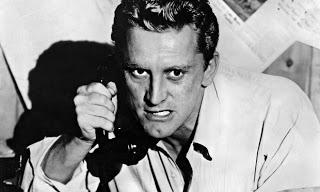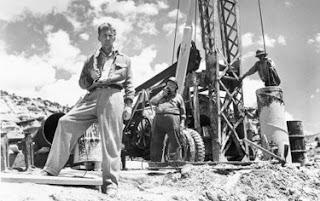
"I don't make things happen; all I do is write about them!"
Few embraced Billy Wilder's Ace in the Hole (1951) upon release. Bosley Crowther led the critical backlash, branding it a "dramatic grotesque" with "a poorly constructed plot." Audiences didn't cotton to the film's bleakness, granting Wilder his first flop. Few films were so clearly ahead of their time.Chuck Tatum (Kirk Douglas) is a bigshot reporter exiled to Albuquerque, New Mexico. Desperate for a break, Tatum stumbles across Leo Minosa (Richard Benedict), buried in an Indian ruin by a landslide. Tatum seizes upon the story, rushing his report to print while manipulating local officials to delay Leo's rescue. Soon Escudero swarms media and tourists, Tatum raking in accolades even as Leo nears death.
Ace in the Hole surpasses The Front Page's jokes about amoral reporters. Tatum is Classic Hollywood's greatest antihero. He browbeats the Sheriff (Ray Teal) into delaying rescue, fabricating an Indian curse and paints Leo's bitter wife Lorraine (Jan Sterling) as a lovesick sweetheart. When his story sells, he mocks his ex-employers by demanding an exorbitant salary. He engineers a literal carnival complete with Ferris wheels, hotdog stands and thousands of curious tourists.
Kirk Douglas bolsters Ace with a brilliant performance. Douglas contorts his charm into a savage monster, twisting arms, glad-handing officials and slapping Lorraine into compliance. Intensely physical and ruthlessly cunning, Douglas offers the viewer a rogue with no redeeming qualities, desiring only success; even his belated change of heart is self-motivated. What good's a rescue if the victim dies?

Wilder (with cowriters Walter Newman and Lesser Samuels) contrasts Leo's plight, and the naïve attentions of his father (John Berkes) and mother (Frances Dominguez), with Tatum's heartlessness. Ace offers only bemused contempt at Tatum, the lesser hucksters and their gawking crowds; there's little relief from Wilder's scorn. No wonder 1951 viewers didn't embrace it; even Sunset Blvd. provided mordant wit amongst the gloom.
Jan Sterling's beaten-down, weary performance provides Douglas a perfect foil. Porter Hall plays Tatum's editor, making a futile appeal for morality; Robert Arthur is Tatum's eager protégé. Ray Teal, Lewis Martin and John Berkes play assorted townspeople caught in, or manipulating the tragedy; Richard Benedict devolves from cheerful resolution to despair.
Billy Wilder mostly stuck to light comedy after Ace in the Hole. Even the much-loved Some Like it Hot and The Apartment aren't half as memorable as his one-two punch of Sunset Blvd. and Ace. Ace's despairing tone and mistrust of media hype mark it more relevant now than ever.

